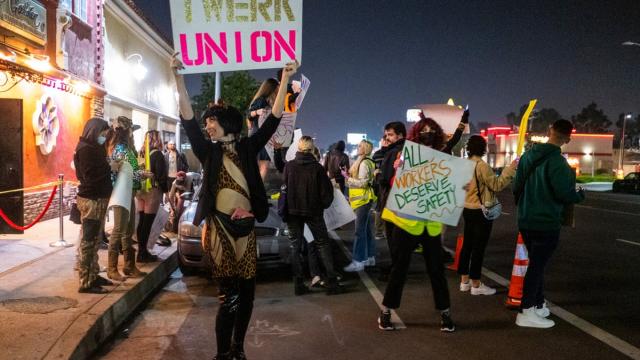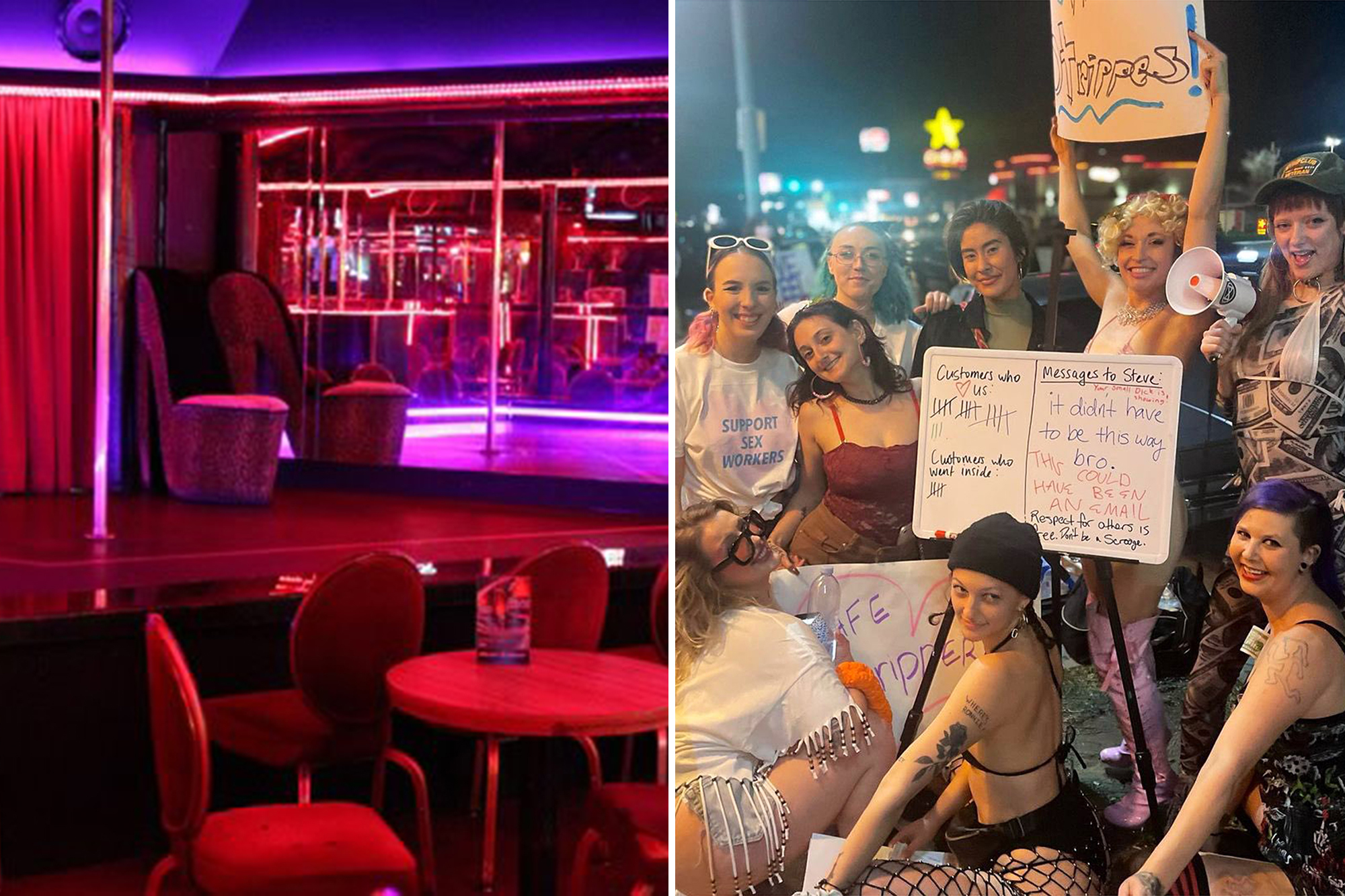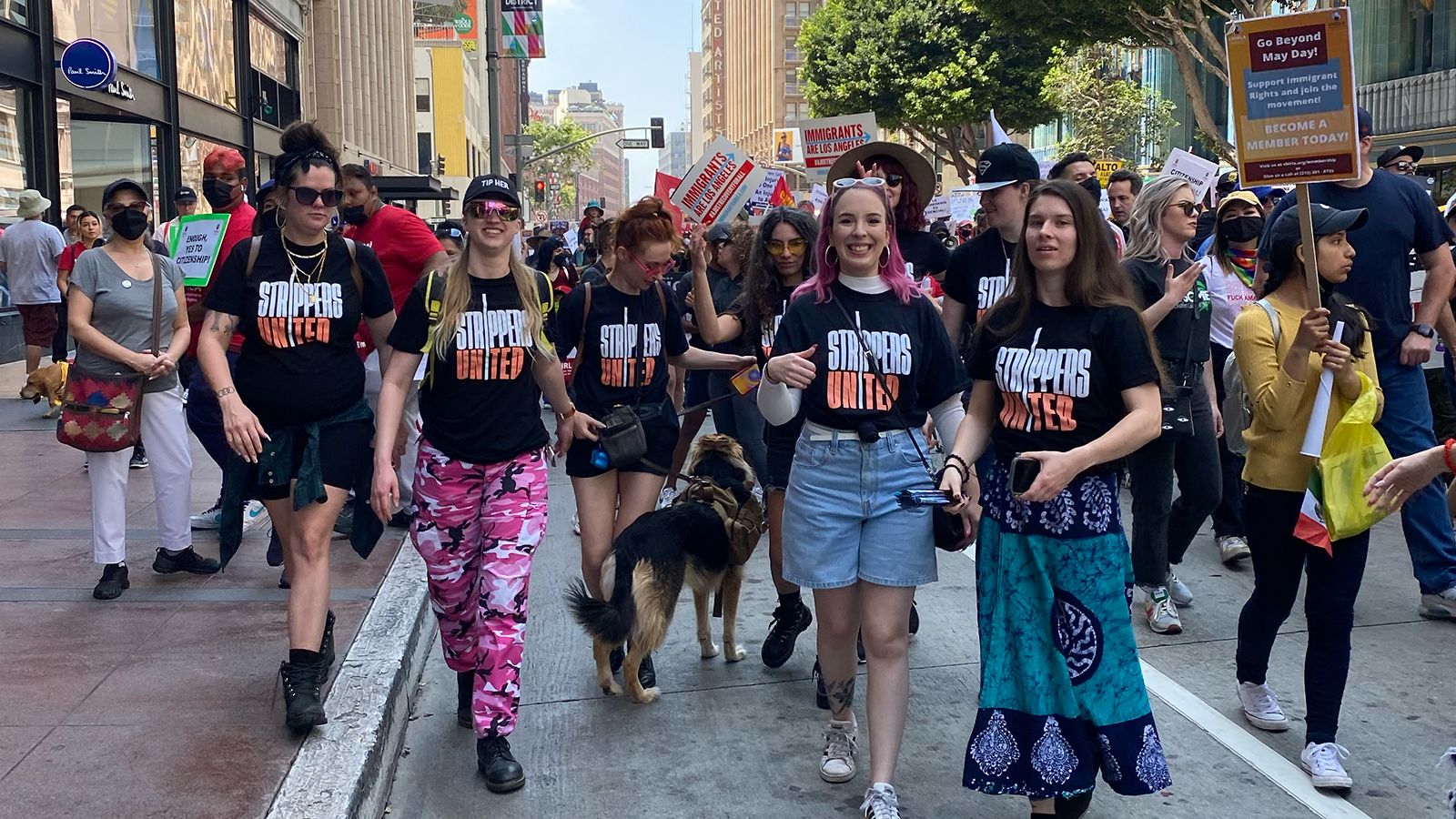
The wave of post-pandemic unionization that kicked off with “Striketober” in the fall of 2021, with walkouts at Starbucks, Amazon, and other large employers, is now spreading to strip clubs.
While Hollywood typically frames strip clubs as seedy vestiges of patriarchy with sticky concrete floors where desperate women in need of tuition money or food for their kids are exploited, workers are paid cash under the table, and where dreams go to die, the reality is a lot more nuanced. Reese Piper, a former stripper, argued in InsideHook that heterosexual Millennials and Zoomers – who tend to be more feminist-leaning than their Gen-X and Boomer counterparts – are misunderstanding strip clubs and unintentionally maligning the women who depend on them for their income:
I get what these men are trying to do — or think they’re doing. They think that by rejecting strip clubs and the women who perform in them, they’re being “better men” than their forefathers by not “objectifying women.” To these men, strip clubs are a tawdry, dated destination for a certain kind of uncouth brute where no woman-respecting gentleman would be caught dead outside of a bachelor party they’ll be quite eager to remind you they attended only with the utmost reluctance. These — I believe well-meaning — men think they’re being progressive icons of modern male feminism. Unfortunately, what they’re actually being is whorephobic. Breaking: You can respect women and enjoy strip clubs. You can literally do both of those things at the same time. In fact, if you think that going to a strip club sullies your good woman-respecting name, then — hate to break it to you — you probably don’t really respect women at all, since you can’t seem to bring yourself to respect strippers.
In addition to not being respected by a large cross-section of men, strippers are routinely disrespected by their employers. According to a 2019 article in The Guardian, most strippers in the US are classified as independent contractors, meaning they aren’t eligible for sick leave, overtime, or unemployment benefits, and they also don’t get to pay into Medicare and Social Security, making them more likely to struggle financially as seniors. Moreover, strippers are often charged to work in what’s called “pay for the pole” policies. This fee to perform can be anywhere from five dollars to well over a hundred. And if a stripper is late, calls in sick, or doesn’t make enough to pay that fee, she can even owe back rent to the club.
To further underscore the need to support local strippers, a strip club near you may soon become a hotbed of progressive, working-class politics: Strippers’ new unionization push on the West Coast could kick off a wave of labor militancy this summer. This has the potential to kick off a mass awakening for class consciousness across the United States.
Los Angeles: Home to America’s first unionized strip club
After a 15-month legal battle with ownership, dancers at the Star Garden Topless Dive Bar in North Hollywood have officially won recognition of their union, according to the Associated Press.
“It feels like the most important work I’ve ever done,” said Reagan, a Star Garden stripper, in an interview with the AP.
While the details of the actual union contract are still being ironed out, Star Garden dancers are now officially affiliated with the Actors’ Equity Association, which boasts more than 51,000 members in the theatrical performance industry. One sticking point for dancers was enhanced security: Strippers reported feeling unsafe in the club when patrons were allowed to stay past closing time, which allowed some customers the ability to see dancers outside of their stripper persona, and take note of what car they drove to the club. If a customer made a performer feel unsafe, management reportedly insisted she come to them first before telling security, and management would determine whether or not a customer was inappropriate enough to warrant alerting security staff. In several cases, dancers were allegedly fired for complaining about the lack of safety, and on another occasion for intervening when a customer was filming a dancer from their phone.
“Lilith,” a Star Garden dancer, told the AP that staff felt that a union was the most natural means of collectively addressing safety-related issues.
“[W]hen we started noticing that there were some safety concerns that we all had, it didn’t take long for us to band together and decide we needed to do something about it,” Lilith said.
It didn’t take long after Star Garden’s union was recognized for another strip club to follow its example. Performers at Magic Tavern in Portland, Oregon have also filed for a union election with the National Labor Relations Board (NLRB) in response to what dancers allege are “dangerous working conditions” and a “lack of professionalism” from ownership and other staff. The unionization push came after a strike in April in which dancers walked off the job in protest of working conditions at the club. A 2018 study (PDF link) from Portland State University found that strippers in Portland “are at risk of experiencing various forms of violence while at work with limited resources to turn to for help.”
A change.org petition outlines grievances Magic Tavern dancers say they have endured, which includes a lack of security cameras and security guards, the presence of patched biker gangs in the club despite promises that such individuals would be denied entry, demeaning and belittling comments from the owner, staff, and customers, and retaliatory firings of strippers who spoke out about their concerns – including some dancers who were fired via text or Instagram, and some who were pulled from the schedule without being notified. The petition has more than 2,000 signatures as of this writing.
According to local media, Actors Equity is also representing Magic Tavern dancers in their union drive.
“We’ve already demonstrated in Los Angeles that strippers who want a union not only deserve one, but can win one,” Actors’ Equity president Katie Shindle stated on the union’s website. “[Magic Tavern dancers’] boldness in sticking up for themselves and their tenacity in holding to what they know is right is going to get them union recognition and a contract worthy of their labor.”
The implications of strippers unionizing en masse
The strip club sector is not an insignificant part of the economy: IBISWorld reports that there are 4,042 strip clubs in the United States as of 2023, which is a 0.5% year-over-year increase. Should Magic Tavern dancers also be successful in their union drive, other dancers at thousands of similar clubs nationwide could be inspired to form unions at their workplaces. This will inevitably lead to countless discussions about workers’ rights, collective bargaining, and working class solidarity between strippers and club patrons, potentially inspiring further labor action elsewhere. When union contracts are finalized at Star Garden and Magic Tavern, it could lead to strippers being taxed more fairly, helping union-affiliated strip clubs become more legitimate enterprises. And the unionization of strippers could be a gateway to the decriminalization of sex work.
It isn’t a far-fetched idea to imagine a huge unionization push based on the actions of two strip clubs: Starbucks baristas were inspired to form unions after a store in Buffalo, New York became the first to do so in 2021. By the end of 2022, over 300 stores in more than three dozen states held their own union elections, with 245 of those stores voting to affiliate with Workers United, which now represents approximately 6,500 Starbucks employees. Just as strip club owners did at Star Garden and Magic Tavern, Starbucks resisted unionization efforts by utilizing questionable and even illegal union-busting tactics.
The Starbucks union drive scared management so much that the company brought company founder Howard Schultz out of retirement as CEO in April of 2022 to crush baristas’ efforts to organize. Under Schultz’s leadership, the company accumulated more than 513 charges of unfair labor practices according to NLRB spokeswoman Kayla Blado. More than 100 of those charges were against Schultz himself. As a result of these charges, the NLRB issued 83 formal complaints against Starbucks (a formal NLRB complaint can result in reinstatement of and back pay for workers who experienced illegal retaliatory firings). Schultz stepped down as interim CEO in March of 2023, two weeks earlier than expected. After a new CEO was named, Schultz said he was “never coming back again.”
In May, Senator Bernie Sanders (I-Vermont) grilled Schultz over his company’s anti-union practices.
“Over the past 18 months, Starbucks has waged the most aggressive and illegal union-busting campaign in the modern history of our country,” Sanders said during the hearing. “That union-busting campaign has been led by Howard Schultz, the multibillionaire founder and director of Starbucks who is with us this morning only under the threat of subpoena.”
Companies fight vociferously against unions because of the immense power they give workers. As Occupy.com has previously reported, unionized workers typically make at least 10% more than their non-union counterparts, are more likely to have paid time off, and almost always pay less for healthcare than non-union workers, in addition to the enhanced job security that comes from having a union contract. After all, if strip clubs can unionize, why can’t your workplace?
Carl Gibson is an independent journalist and columnist whose work has been published in CNN, The Guardian, The Washington Post, The Houston Chronicle, The Louisville Courier-Journal, Barron’s, Business Insider, The Independent, and NPR, among others.
















